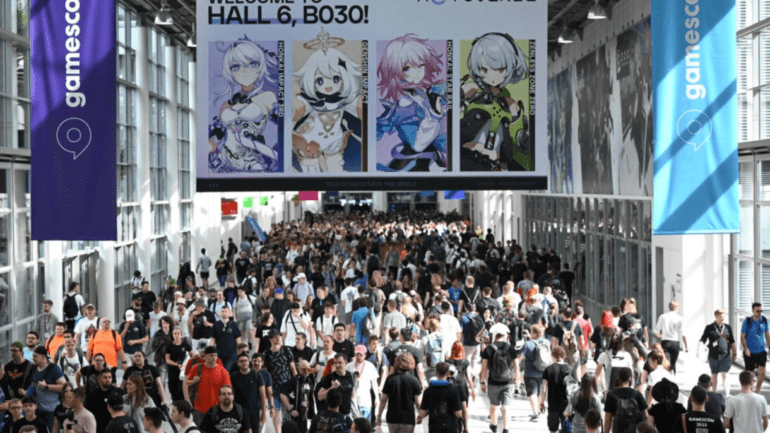TL;DR:
- AI’s significant influence is evident at Gamescom, the premier gaming event.
- AI drives innovation from storylines to code generation, sparking industry transformation.
- Concerns arise about potential job displacement and its impact on artistic creativity.
- AI generates personalized game worlds and characters, heralding a new era of creativity.
- Legal complexities emerge as AI-created content intersects with intellectual property rights.
Main AI News:
The pulsating heart of the gaming world, Gamescom, reveals the transformative influence of artificial intelligence (AI) on the landscape of interactive entertainment. From scripting narratives to programming entire virtual realms, AI’s pervasive presence is unmistakable, and yet, the industry remains cautiously intrigued. The specter of potential job displacement and the overshadowing of artistic ingenuity loom, casting a wary veil over this digital revolution.
Julien Millet, an AI engineer and the visionary force behind United Bits Game studio, reflects, “AI marks an unequivocal juncture.” His presence at the recent industry exposition underscores the gravitational pull AI exerts. With an uncanny ability to sculpt responsive non-playable characters and weave intricate gaming scenarios from lines of code, AI has emerged as the secret artificer of innovation.
Envision this: AI conjuring vivid illustrations from mere text, enabling creators to seamlessly transmit their creative visions. As Millet espouses, AI’s dexterity in rendering images challenges the status quo, raising concerns for concept artists who conceive virtual realms before their digital birth. The cherished roles of these artists may find themselves besieged.
‘Dreamscapes’ Unleashed
Amidst the throngs of gaming aficionados that flock to Gamescom each year, studios find their canvas for showcasing the latest masterpieces of interactive entertainment. These enthusiasts, often adorned in elaborate cosplay costumes, delve into experiential realms, some adorned with AI’s imprimatur. Enter Club Koala by Play for Fun, an innovative venture that employs AI to craft personalized paradises, replete with unique AI-generated characters.
Fang Han, the perceptive CEO of Play for Fun, remarks, “AI is no longer an abstraction; it is woven into the fabric of daily life.” The potential it offers to elevate the gaming industry is staggering. In Berlin, Ivy Juice Games testifies to AI’s augmentation of creativity by infusing AI-generated text lines into their games, thereby intensifying the narrative dynamics.
Moreover, Linus Gaertig of Ivy Juice Games reveals that AI’s hand extends to code generation, unlocking novel avenues for developers to construct immersive gaming universes. Sarah Brin of Kythera AI emphasizes that AI’s enigmatic algorithms introduce an element of unpredictability, rendering games more authentic and dynamic. Nvidia, the vanguard of AI innovation, dazzles with ACE, a software enabling developers to birth ‘intelligent in-game characters,’ exemplified in a surreal tête-à-tête with a virtual ramen chef in a futuristic pub.
Navigating the Copyright Conundrum
While the momentum behind AI seems irresistible, complexities emerge at the nexus of virtual creation and intellectual property rights. The proliferation of AI-engineered virtual landscapes could inadvertently clash with the foundations of copyright law. Sarah Brin aptly cautions, “Generative AI, while remarkable, invites legal vulnerabilities.” For prominent publishers, a dalliance with generative AI may inadvertently entangle them in copyright disputes, thus exposing a rift in the fabric of creativity.
Distinctive Paths to Mastery
Among the AI trailblazers, Kythera AI stands resolute, eschewing the well-trodden path of training their AI on open databases. A proactive stance, born from an understanding of the regulatory landscape, distinguishes them from their contemporaries. A precedent echoes across the Atlantic, where artists in the United States have mounted a collective legal challenge against AI models that have harnessed images from the boundless expanse of the internet.
As the gaming cosmos continues to evolve under AI’s meticulous brushstrokes, the industry finds itself poised at the precipice of reinvention. Beyond the gleaming screens and immersive experiences lies a delicate negotiation between creativity and legal intricacies. The allure of AI’s potential is undeniable, but its realization must harmonize with the intricate tapestry of intellectual property and the labor of artists. In this realm of constant flux, Gamescom’s arena offers both the stage for celebration and a forum for dialogue, as the digital odyssey unfolds.
Conclusion:
The realm of gaming is undergoing a profound metamorphosis, as AI takes center stage at Gamescom. While AI’s capabilities are transformative and captivating, there is a palpable tension between its potential to revolutionize gaming and the concerns surrounding job displacement and intellectual property rights. As the industry embarks on this uncharted path, stakeholders must tread carefully to harness AI’s potential while ensuring the preservation of creativity and the protection of legal rights. The dynamic interplay between innovation and regulation will undoubtedly shape the future landscape of the gaming market.

